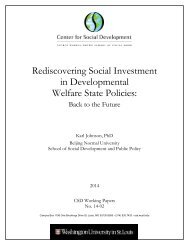Exploring and Assessing Intercultural Competence - Center for ...
Exploring and Assessing Intercultural Competence - Center for ...
Exploring and Assessing Intercultural Competence - Center for ...
You also want an ePaper? Increase the reach of your titles
YUMPU automatically turns print PDFs into web optimized ePapers that Google loves.
<strong>Exploring</strong> <strong>and</strong> <strong>Assessing</strong> <strong>Intercultural</strong> <strong>Competence</strong><br />
Abstract<br />
“<strong>Exploring</strong> <strong>and</strong> <strong>Assessing</strong> <strong>Intercultural</strong> <strong>Competence</strong>,” is a research project of the Federation of<br />
The Experiment in International Living (FEIL), conducted from July 2005 through December<br />
2006, with funding support from the <strong>Center</strong> <strong>for</strong> Social Development of the Global Service<br />
Institute at Washington University in St. Louis, Missouri. This project was designed as the initial<br />
phase of an extended future study, pending further funding. Its purpose was to explore <strong>and</strong><br />
develop a comprehensive construct of intercultural competence, develop a tool <strong>for</strong> its assessment,<br />
<strong>and</strong> investigate intercultural outcomes on participants <strong>and</strong> their hosts in select civic service<br />
programs including implications <strong>for</strong> their lives <strong>and</strong> work. The study was conducted through use<br />
of a survey questionnaire followed by individual interviews, collecting both quantitative <strong>and</strong><br />
qualitative data.<br />
The research project is important to the Experiment Federation worldwide because it: a) engaged<br />
three Member Organizations (Great Britain, Ecuador, <strong>and</strong> Switzerl<strong>and</strong>) in a learning process that<br />
will further their ef<strong>for</strong>ts in several areas, b) improve underst<strong>and</strong>ing of <strong>and</strong> further FEIL’s goals<br />
<strong>and</strong> modus oper<strong>and</strong>i, c) has the potential to improve delivery of its volunteer service projects (<strong>and</strong><br />
related programs), <strong>and</strong> d) may enhance development of the intercultural competencies of future<br />
participants <strong>and</strong> possibly of their mentors <strong>and</strong> hosts as well. Finally, this ef<strong>for</strong>t also contributes<br />
important knowledge to the field of intercultural education regarding international <strong>and</strong><br />
intercultural ef<strong>for</strong>ts concerned with the identification, development, assessment, <strong>and</strong> impact of<br />
intercultural competencies on the lives of those involved.<br />
Key Words: intercultural education, intercultural competence, host language proficiency, service<br />
volunteers, intercultural sojourns, outcomes assessment<br />
<strong>Center</strong> <strong>for</strong> Social Development<br />
Washington University in St. Louis<br />
4
















